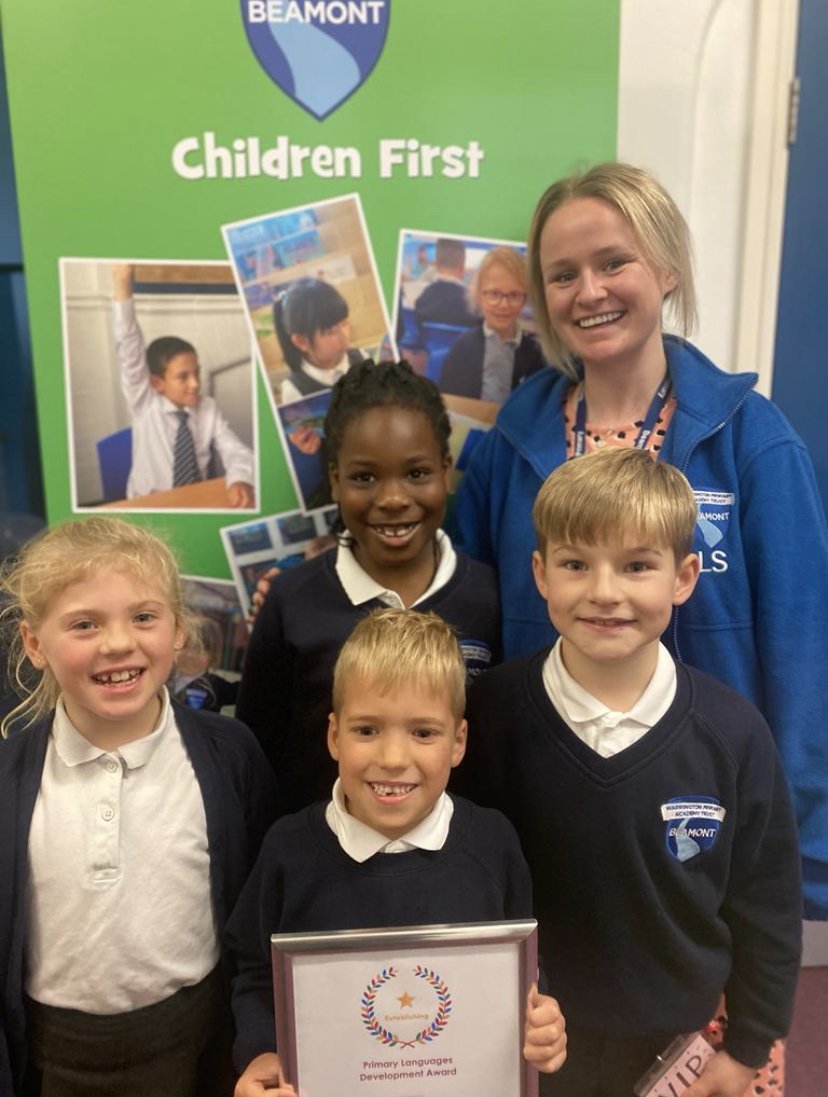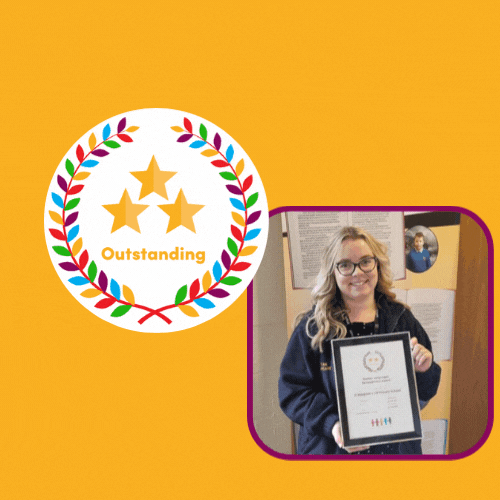Primary Languages Award
Enabling primary schools to evaluate, strengthen and celebrate their MFL provision
The Primary Languages Development Award enables primary schools to evaluate, strengthen and celebrate their MFL provision.
Assessment Criteria
School Improvement Planning (SIP)
Subject Coordination
Staff training and CPD
Teaching and learning of MFL
Tracking and assessment
Links abroad
Transition to KS3
Primary Schools can take the award to ensure they are prepared for an Ofsted inspection and confirm languages are embedded in their primary curriculum.
Schools can achieve Establishing, Enhancing or Outstanding awards
To achieve a Primary Languages Development Award schools follow a simple process of self–assessment and evidence gathering supported by our primary languages mentor and submit this online to our Primary Languages Network VLE.
Application requirements
Any school can apply for our Primary Languages Development Award
Purchase online or complete our online Order Form
Schools must complete a baseline primary languages questionnaire
The Primary Languages Development Award can be renewed bi-annually and costs:
Pricing
Any school can apply for our Primary Languages Development Award
Outstanding Award £350.00
Enhancing Award £300.00
Establishing Award £250.00
PLN members receive 25% discount
Full description of each award
Establishing Award *
School improvement planning
There is an agreed school vision for the development of PFL in school. PFL first steps are in this academic year’s SIP. Audit of staff skills is being used to inform future steps toward effective language teaching and learning in KS2. SLT and Subject coordinator have held a staff CPD session to brief teachers on roll out of PFL in KS2 (possibly KS1). Parents and wider community informed of developments in delivery of PFL across KS2 (KS1)
Subject Coordination
Subject coordinator appointed and receiving training and support from outside agencies. The subject coordinator has a developing understanding of the requirements of the KS2 PFL POS. The subject coordinator is using the staff audit and school vision to inform school’s first steps in language learning. Subject coordinator is informing his/herself of the development of language learning skills when leaning a foreign language. Long term planning is being developed by the subject coordinator for PFL across KS2 (possibly KS1).
Training and CPD
All staff aware of the learning objectives in the DFE KS2 MFL POS and school long term vision for PFL in school. All staff offered language up-skilling CPD opportunities both in house via VLE and by external net-work CPD provider. Subject coordinator is supporting staff in their own developing under-standing of how to teach a PFL.
Teaching and learning of MFL
1Teaching and learning is planned for on a regular weekly basis to all KS2 and an effective SOW is accessi-ble with sound file and language support where necessary. PFL teaching and learning intends to address the 12 DfE KS2 MFL PoS Languages Attainment Targets including phonics, grammar and the use of bilingual dictionaries. Opportunities to share good work is planned for – display, class and whole school assembly input. Teachers are experimenting with the use of authentic rhymes, songs and story books /online stories as part of the teaching and learning of the target language. Children have access to target language spoken by a native speaker.
Tracking and Assessment.
Tracking and assessment tools are being considered and trialed. Some informal tracking is taking place. Some AfL and self-assessment is taking place.
Links Abroad
School celebrates Europe-an Day of Languages. Children explore the target language country and celebrate/ compare home cultures and the culture of the target language country/countries. The subject coordinator is beginning to investigate the local wider community and the potential of native target language speakers as guest speakers etc in school.
Transition to KS3
School is investigating local high school/s language choice and provision. The subject coordinator is attempting to establish contact with local KS3/4 MFL teachers.
*You will need to provide evidence that you can meet the requirements of all criteria for each level of award. The award levels are cumulative (therefore to apply for the Enhancing award, the criteria for the Establishing award must also be met).
Enhancing Award *
School improvement planning
SLT briefed on developments in PFL by subject coordinator on a regular basis. PFL is an integral part of weekly learning programme in KS2 (possibly KS1). Evidence of pupil progress in PFL is saved and used to celebrate success and inform next steps in T+L. PFL is an integral part of the SIP
Subject Coordination
The subject coordinator is able to support staff with the delivery of language learning or can confidently liaise and plan with the visiting teacher/language assistant. Long term and medium term plans are now in place to guide and support the progress in PFL T+L across KS2. The subject coordinator supported by SLT /governors is beginning to monitor progress in language learning. Succession guidance and documentation is in place to support school should there be a change to the person i/c PFL development
Training and CPD
School confidently plans language learning in line with the DfE KS2 MFL Attainment Targets and can access support and guidance when appropri-ate from in school and from external/online CPD providers. New staff have access to school documentations/ vision and appropriate CPD. Staff can access further language up-skilling support and CPD when necessary.
Teaching and learning of MFL
Prior knowledge and skills are revisited and built upon to enable pupil progression in language learning skills, phonics and basic target language sentence structure. Bilingual dictionaries are always accessible and are used regularly in class language learning activities. Teachers use of story both books and online stories as part of the teaching and learning of the target language and looking for creative language learning opportunities based on story. Opportunities to share good work is planned for - display, class and whole school assembly input, links with others subject areas is being explored. Cross curricular and seasonal learning opportunities are being planned for and developed when real links with other curriculum areas can be identified.
Tracking and Assessment.
A record system is in place and is being shared across the staff. Informal evidence and real data demonstrating progress is being collected and used to inform next steps in PFL T+L. Reporting to parents is moving from informal, anecdotal and being formalised at the end of the year.
Links Abroad
School celebrates festivals from target language countries as part fo the whole school calendar of celebrations. School endeavours to have virtual or face to face contact with native speakers as appropriate during the PFL teaching and learn-ing programme in KS2 (and possibly KS1)
Transition to KS3
KS3 MFL colleagues are invited to attend whole school PFL events and celebrations. The subject coordinator and SLT are endeavouring to develop purposeful dialogue with KS3/4 colleagues regarding school’s progress in PFL
Outstanding Award *
School improvement planning
SLT and/or an appointed governor and subject coordinator carry out school learning walks and T+L observations and feedback is given as part of whole school improvement planning. Observations of language learning show evidence of challenge, rigour and pace and effective learning progress. Observations of lessons demonstrate that all KS2 pupils are supported appropriately in their target language learning. School plans for and makes links across the whole school curriculum in the teaching of PFL.
Subject Coordination
The subject coordinator is well supported by SLT and has access to CPD and resources when required. The subject coordinator is able to reflect upon data and anecdotal observations and plan next steps for the school in language learning. The subject coordinator shares next steps with staff both informally and at staff briefing sessions.
Training and CPD
School shares good practice with other schools via local PFL network. Subject coordinator has access to innovative and challenging CPD- to plan for future PFL learning opportunities. There is evidence of whole school CPD on PFL tracking and assessment.
Teaching and learning of MFL
Across KS2 there is evidence of challenge, rigour and planning for progress in the T+L of PFL. 3.4b Additional language learning oppor-tunities are being planned for and delivered. Evidence in planning shows that opportunities are given to the children at an age and stage appropriate level to develop independence listening, speaking, reading and writing accurately at sentence level in the target language. Staff share good practice and develop new approaches to effective primary foreign language learning. Cross curricular learning opportunities are well signposted, resourced, shared and planned for and enhance the teaching of learning across the curriculum.
Tracking and Assessment.
There are records for each year group available demonstrating progress across all 4 core skills, phonics and basic grammatical understanding. AfL and self-assessment by the children of progress is evident and is used effectively to inform next steps in T+L of PFL. There is an end of year PFL comment in the children’s reports on each child’s progress., Shared with parents.
Links Abroad
Children are able to describe some age appropriate everyday life, culture and festivals of a target language country. Children participate in school in celebrations from the target language country/ies. Snail mail/, a physical visit/ SKYPE virtual visits are being/have been arranged between school and native speakers in a target language school.
Transition to KS3
Effective documentation and data sharing (Y6 to Y7) is available and offered to local high schools for progress in to KS3 MFL. KS3 MFL colleagues are welcome to deliver short language learning taster sessions in KS2 in preparation for KS3 Y7










